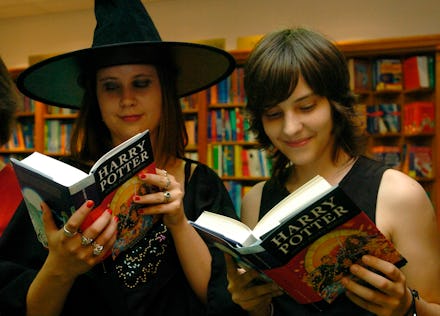School Principal Says Reading 'Harry Potter' and 'Game of Thrones' Causes Brain Damage

Stay off the "addictive" fantasy novels, kids, because you'll get hooked and then irreparably damage your brain — at least according to this one school principal in the U.K.
Graeme Whiting, the headmaster and founder of the Acorn School, an independent private school in Gloucestershire, U.K., wrote a convoluted blog post recently in which he denounced "sensational" fantasy novels like the Harry Potter series and the Lord of the Rings books.
"I want children to read literature that is conducive to their age and leave those mystical and frightening texts for when they can discern reality, and when they have first learned to love beauty. "Harry Potter," "Lord of the Rings," "Game of Thrones," "The Hunger Games" and Terry Pratchett, to mention only a few of the modern world's 'must-haves,' contain deeply insensitive and addictive material which I am certain encourages difficult behavior in children; yet they can be bought without a special license, and can damage the sensitive subconscious brains of young children, many of whom may be added to the current statistics of mentally ill young children."
That's right, Headmaster Whiting thinks you should need a special license to buy fantasy series. Honestly that seems a lot like something Dolores Umbridge would say.
Whiting also went off on the irresponsible mothers who let their children corrupt their minds with these terrible books, saying "Last week I saw a mother sitting on a bench in a shopping mall with her young baby, sampling the milk from its bottle to make sure it was the right temperature and flowed freely. ... Will that same mother, in thirteen years time, when that baby becomes an opinionated young teenager, be able to offer the same care? Will the mother sample the literature that it reads like it did the baby's bottle."
Um, what? The thing is, Whiting is totally wrong. Not only is reading in general shown to be beneficial to your brain in all sorts of ways, but reading fantasy novels may also help children grow their vocabulary and develop curiosity about the world around them.
In an article published in the March issue of Scientific American, researcher Deena Weisberg explained that studies indicate that "unrealistic scenarios help children see the possibilities inherent in reality."
Maybe Whiting is just bitter that he never got his Hogwarts acceptance letter.
Read more: This Couple's Harry Potter-Themed Wedding Will Make You Cry Wizard Tears